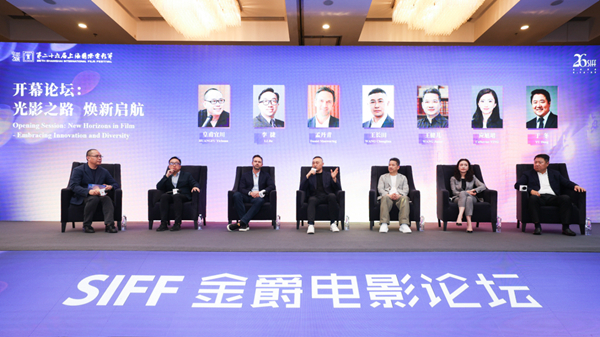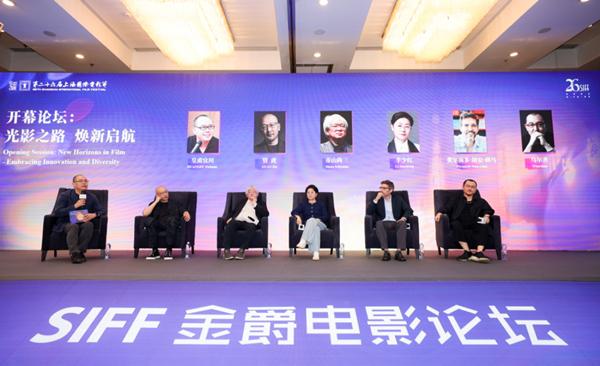
 0 Comment(s)
0 Comment(s) Print
Print E-mail China.org.cn, June 21, 2024
E-mail China.org.cn, June 21, 2024
Prominent film figures gathered at a forum during the 26th Shanghai International Film Festival (SIFF) on June 16 to explore ways of enhancing international cooperation and creating films with universal appeal, with the aim of fostering sustained, high-quality development of China's film industry on the world stage.

Film executives take part in a forum held in Shanghai during the 26th Shanghai International Film Festival (SIFF), June 16, 2024. [Photo courtesy of the SIFF Organizing Committee]
"Whether in terms of production or distribution, Chinese films need to reach out more," said Catherine Ying, vice president of CMC Inc. and president of CMC Pictures. "The most important point is that Chinese companies and filmmakers need to actively and comprehensively participate in the global circulation of films with an extremely open attitude."
She elaborated that Chinese filmmakers and enterprises need to become members of the global film industry, such as through various international organizations like Hollywood writers' and actors' guilds, so that they can better negotiate with international production companies, producers, directors and actors. By doing so, they can also gain greater insights into the global film environment. Ying highlighted the international collaboration models of "The Meg" series and upcoming "Decoded," characterized by equal, free and open exchanges at all levels, which are key to going global.
On the distribution front, Ying expressed hopes of establishing an efficient global network, covering theatrical releases and new media and emerging distribution channels enabled by modern technology. This could help find and nurture audiences for Chinese content, advancing the globalization of Chinese cinema.
Fernando Juan Lima, chairman of the Mar del Plata International Film Festival in Argentina, underscored that China's unique perspective and rich cultural heritage could lay the foundation for significant success. He stated that collaboration with major distribution networks is vital for entry into international markets.
Daniel Manwaring, CEO of IMAX China, stressed that IMAX is looking to enhance overseas distribution of Chinese films through its extensive global network, and seeking diverse content will be a crucial aspect of the future film market. He cited the examples of IMAX theaters broadcasting NBA games in Hong Kong and Taiwan as well as Taylor Swift's concert film release on the Chinese mainland. "All of the NBA events were sold out. Surprisingly, 80% of the audience hadn't visited cinemas in three years, but this brought them back to experience the theater's stunning impact," he said.
Rather than trying to make films that pander to global audiences and award juries as in previous years, more and more Chinese filmmakers now realize that distinct and sincere works that stay true to the creators themselves already have great appeal worldwide.
"The language of film itself is international — it's not just spoken language, but a language that represents our minds and worldviews, a language shared universally," director Li Shaohong noted.
Director Wuershan concurred with Li and revealed that his blockbuster "Creation of the Gods I: Kingdom of Storms" will be released in Europe this year. "I never pursue the goal of 'going global.' Instead, my goal is to authentically express our inner world, honestly confront our emotional lives, and genuinely tell the stories I wish to share. Human emotions are universal; if we are moved, audiences from different cultures, nations and regions around the world will be moved as well," he said.

Chinese filmmakers and international film festival executives take part in a forum held in Shanghai during the 26th Shanghai International Film Festival (SIFF), June 16, 2024. [Photo courtesy of the SIFF Organizing Committee]
Shozo Ichiyama, program director of the Tokyo International Film Festival, shared his observation that in recent years, more audiences worldwide are willing to embrace films from diverse cultural backgrounds, seeking artistic elements that are different from those in their own nation's cinema. "For creators, you simply need to sincerely express your artistic sentiments and present the results to the audience," he said.
Wang Changtian, chairman of Enlight Media, expressed concerns about the market share structure of China's film genres, pointing out that animated and science fiction films hold disproportionately low shares of total box office earnings. In a significant announcement to address that, he revealed that his company is developing a film adaptation of sci-fi epic "The Three-Body Problem" directed by China's most esteemed director, Zhang Yimou, hoping to capture the essence of the novel and achieve breakthroughs and innovations that resonate internationally.
Yu Dong, founder and chairman of Bona Film Group, suggested that Chinese filmmakers could seek to express international themes in future genre films. This may include telling stories about Chinese people going on adventures overseas or living abroad, a subject that has not been explored enough in today's global cinema.
In order to create a more diverse Chinese film market, Li Jie, president of Alibaba Pictures, said, "audiences should also have the opportunity to choose from a variety of good films from around the world, encompassing different types, cultures and expressions, as these films can help cultivate a passion for cinema among moviegoers."
Go to Forum >>0 Comment(s)